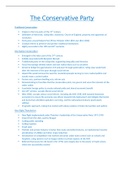The Conservative Party
Traditional Conservatism
Origins in the tory party of the 17 th century
Defenders of hierarchy, ruling elite, monarchy, Church of England, property and opponents of
revolution.
Party grew around Robert Peel (Prime Minister 1834-1835 and 1841-1846)
Gradual reform to preserve and protect traditional institutions
Highly successful in the 19th and 20 th centuries
One Nation Conservatism
Emerged in the latter part of the 19 th century
Initially associated with Benjamin Disraeli
Traditionally party of the ruling elite, supporting inequality and hierarchy
Faced increasingly divided nation and new radical ideas such as socialism
Aimed to bridge the gap between rich and poor through paternalism; ruling class would look
after the interests of the poor through social reform
Hoped this would remove the need for revolution/people turning to more radical politics and
would create a united nation
Factory acts, partisan dwelling acts, reform acts
Demonstrating to franchise that the conservative party can govern and serve the interests of the
wider nation
A patriotic foreign policy to create national pride and shared economic benefit
Into 20th century, accepts liberal social reform
After WW2, accepts Labour social reform, including the NHS 1948, shift towards Keynesian
economics to ensure the economy was driven towards full employment and mitigate the booms
and busts that unbridled capitalism can bring, and the nationalised industry (particularly
utilities)
Pragmatic approach, mixing free market with Labour policies of state intervention and welfare
New Right/Thatcherism
New Right implemented under Thatcher’s leadership of the Conservative Party 1975-1990
Import from the USA, used by Reagan
Cutting public spending
Cutting taxation
Small state
Markets and private industry is better than state-controlled industry, so implemented massive
privatisation of utilities and other major industries
Introduction of competition into markets and areas under state control such as schools and
hospitals, using systems such as league tables or private aspects of the NHS
Believed that issues the UK faced in the 1970s were largely due to the power of trade unions,
which she successfully crushed
Traditional Conservatism
Origins in the tory party of the 17 th century
Defenders of hierarchy, ruling elite, monarchy, Church of England, property and opponents of
revolution.
Party grew around Robert Peel (Prime Minister 1834-1835 and 1841-1846)
Gradual reform to preserve and protect traditional institutions
Highly successful in the 19th and 20 th centuries
One Nation Conservatism
Emerged in the latter part of the 19 th century
Initially associated with Benjamin Disraeli
Traditionally party of the ruling elite, supporting inequality and hierarchy
Faced increasingly divided nation and new radical ideas such as socialism
Aimed to bridge the gap between rich and poor through paternalism; ruling class would look
after the interests of the poor through social reform
Hoped this would remove the need for revolution/people turning to more radical politics and
would create a united nation
Factory acts, partisan dwelling acts, reform acts
Demonstrating to franchise that the conservative party can govern and serve the interests of the
wider nation
A patriotic foreign policy to create national pride and shared economic benefit
Into 20th century, accepts liberal social reform
After WW2, accepts Labour social reform, including the NHS 1948, shift towards Keynesian
economics to ensure the economy was driven towards full employment and mitigate the booms
and busts that unbridled capitalism can bring, and the nationalised industry (particularly
utilities)
Pragmatic approach, mixing free market with Labour policies of state intervention and welfare
New Right/Thatcherism
New Right implemented under Thatcher’s leadership of the Conservative Party 1975-1990
Import from the USA, used by Reagan
Cutting public spending
Cutting taxation
Small state
Markets and private industry is better than state-controlled industry, so implemented massive
privatisation of utilities and other major industries
Introduction of competition into markets and areas under state control such as schools and
hospitals, using systems such as league tables or private aspects of the NHS
Believed that issues the UK faced in the 1970s were largely due to the power of trade unions,
which she successfully crushed


